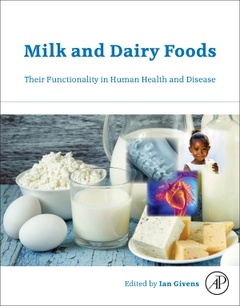Milk and Dairy Foods Their Functionality in Human Health and Disease
Coordonnateur : Givens Ian

Milk and Dairy Foods: Their Functionality in Human Health and Disease addresses issues at key life stages, presenting updates on the impact of dairy on cardiometabolic health, hemodynamics, cardiovascular health, glycemic control, body weight, bone development, muscle mass and cancer. The book also explores the impact of dairy fats on health, dairy fat composition, trans-fatty acids in dairy products, the impact of organic milk on health, milk and dairy intolerances, and dairy as a source of dietary iodine.
Written for food and nutrition researchers, academic teachers, and health professionals, including clinicians and dietitians, this book is sure to be a welcomed resource for all who wish to understand more about the role of dairy in health.
1. Dairy consumption and cardiometabolic diseases: Evidence from prospective studies 2. Dairy fats and health 3. Does modifying dairy fat composition by changing the diet of the dairy cow provide health benefits? 4. Trans and conjugated fatty acids in dairy products: Cause for concern? 5. Organic milk: Does it confer health benefits? 6. Milk proteins: Their role in cardiovascular health 7. Dairy products and diabetes: Role of protein on glycaemic control 8. The dairy food matrix: What it is and what it does 9. The role of dairy products in the development of obesity across the lifespan 10. Adverse reactions to cow’s milk 11. Dairy foods and bone accrual during growth and development 12. Dairy foods as a source of dietary iodine 13. Non-dairy milk substitutes: Are they of adequate nutritional composition? 14. Dairy foods and maintenance of muscle mass in the elderly 15. Dairy foods and the risk of cancer
Food and nutrition researchers, academic teachers, health professionals including clinicians and dietitians
- Addresses the functional effects of dairy related to reducing the risk of key chronic diseases
- Contains information related to various life stages, including chapters on dairy foods and bone development in the young and dairy foods and maintenance of muscle mass in the elderly
Date de parution : 04-2020
Ouvrage de 440 p.
19x23.3 cm
Thème de Milk and Dairy Foods :
Mots-clés :
Adiposity; Adolescents; Adults; Ageing; Animal nutrition; Bioactive peptides; Blood pressure; Bone growth; Bone mineral density; Brain development; Calcium; Cancer; Cardiometabolic; Cardiovascular disease; Cardiovascular disease risk; Cardiovascular health; Cardiovascular risk; Cattle feed; Certification; Cheese; Children; Congenital lactase deficiency; Conjugated linoleic acids; Consumer health; Coronary heart disease; Cow’s milk protein allergy; Dairy; Dairy alternatives; Dairy foods; Dairy matrix; Dairy products; Diabetes risk; Dietary guidelines; Evidencebased; Exclusion diets; Fat; Fatty acid profile; Fatty acids; Food protein enteropathy; Food proteininduced allergic proctocolitis; Food proteininduced enterocolitis syndrome; Fractures; Goitrogen; Human studies; IgEmediated cow’s milk allergy; Inflammation; Intervention studies; Iodine; Iodine status; Lactase insufficiency; Lactase persistence; Lactose intolerance; Leucine; Lipid metabolism; Milk; Milk composition; Milk fat; Milk protein; Monounsaturated fatty acids; Muscles; Nondairy alternative drinks; Nondairy milk substitutes; NonIgEmediated cow’s milk allergy; Nutrient supply; Nutrition; Obesity; Organic; Organic dairying; Organic milk; Oxidative stress; Peak bone mass; Plant lipids; Plantbased milk substitutes; Pregnancy; Protein; Ruminant transfatty acids; Sarcopenia; Saturated fatty acids; Stroke; Trans fat; trans10 C18:1; trans9 palmitoleic acid; Type 2 diabetes; Vaccenic acid; Vascular function; Whey; Whole food approach; Yoghurt; Young adults



